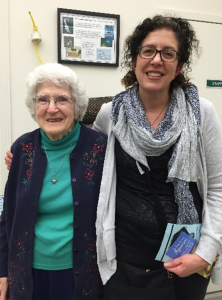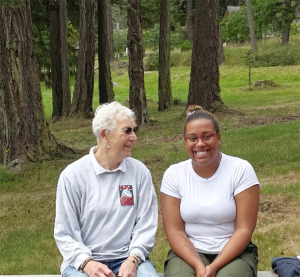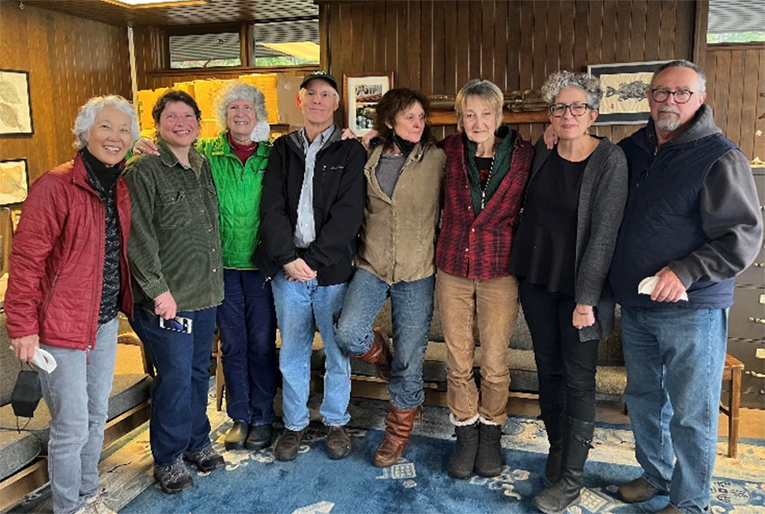FHL Fundraising: Past and Future
by Megan Dethier (with shared details from Rachel Anderson)

This Tide Bite celebrates our fundraising teams over the decades and honors the retirement of an amazing staff member, our Associate Director for Advancement, Rachel Anderson. As we anxiously await the hiring of a replacement for Rachel, this seems like a good time to describe the fundraising process at FHL, how it fits into broader University efforts, and why it is so key for us.
Fundraising at the Friday Harbor Labs is essential for us to function successfully as a world-class institution for marine research, education, and outreach. Outside funds weren’t always so critical — we’ll share more about this issue below.
As you might imagine, funds from donors are used in practically every aspect of FHL operations. We did a back-of-envelope calculation that suggests that almost 25% of the money spent each year ultimately came from a donor! In looking at last year’s budget, we used donor funds for countless purposes including items as diverse as a backup generator for our dining hall (so we can feed students during a power outage), state-of-the-art equipment for researchers, providing lunches for our teaching assistants, offering support for our critical marine operations, and funding postdoctoral fellowships. We even have a fund called “Nuts and Bolts” that, amongst other things, is used to help our always-strained maintenance budget.

By far the most critical role filled by donor funding is the support it provides students who come to FHL for the life-changing experiences they get in our immersive courses and in doing hands-on research. Astute readers will have noted how often our Tide Bites are written by students who acknowledge support from donors. At least 60% of students taking FHL courses get some financial aid from our diverse donor-generated funds (both endowments and current-use). With FHL hosting over 200 undergraduate and graduate students and researchers onsite each year, that is a lot of help for a lot of students! The impacts that these experiences – and thus these funds – have on the lives of students cannot be overestimated.
We often talk about the breadth of the “FHL Community.” Many Labs supporters are past students who felt their time at FHL cemented their love of learning or set them on an unexpected and rewarding career track. Others have spent time at FHL as an instructor, a TA, an independent researcher, a symposium / workshop participant or a Whiteley scholar. We love to hear about these connections, and are grateful that such a large number of individuals are committed to supporting us in so many capacities.
For many decades of FHL’s operation, funding for the University and for the Labs came largely from the State legislature and was generally sufficient, and tuition for in-state students was low in cost. However, as has been true for public universities around the country, this began changing as universities started to be run as businesses and legislatures reduced base funding. FHL received less and less funding because allocations depend on the numbers of students taught, our numbers are small (quality vs. quantity!), and because the University as a whole was struggling with all of its needs. We won’t go into the gory details, but luckily in the 1990s long-term director Dennis Willows “saw the writing on the wall” and had the prescience to begin raising funds from private individuals – friends of FHL – to help fill the looming gaps. Dennis, Megumi Strathmann and Patsy Smith created the FHL Advancement Board (previously named the Development Advisory Board), and this critical group has played an invaluable role ever since. Amongst other accomplishments, the Advancement Board helped establish the Marine Life Endowment (which will continue to support FHL core courses in perpetuity) and the FHL Adopt-a-Student Program. The current FHL Advancement Board, chaired by Flo McAlary and Lesley Nilsson, is a group of 30+ dedicated individuals who work with myself and FHL Advancement staff to further fundraising efforts and to share appreciation and impact with our donors. They are an amazing group!
In the early 2000s Bob Schwartzberg led the successful FHL Advancement program, working closely with Dennis Willows. The year 2004 marked the 100th anniversary of the founding of Friday Harbor Labs; this milestone was celebrated with multiple events and a significant series of scientific symposia. Rachel Anderson joined the FHL Advancement team at that time to help with the Centennial celebrations and other FHL events including “Jazz at the Labs” (a very special event created by Bob to support our K-12 Science Outreach Program). In 2009 when Bob retired from the University, Rachel began her long career leading FHL Advancement efforts. In 2010, FHL became part of UW’s newly-formed College of the Environment and Rachel began working closely with the College’s larger Advancement team to benefit FHL. Valuable collaborative support from both the College and central UW Advancement continues to this day.
Rachel worked alongside four FHL Directors (Dennis Willows, Ken Sebens, Billie Swalla, and now Megan Dethier), Advancement Board chairs and co-chairs, and the FHL Advancement Board for nearly 20 years. Additional FHL staff, especially Kristy Kull and Stephanie Zamora, continue to offer much appreciated Advancement / Communications support. Again, there are so many individuals who contribute to Friday Harbor Labs’ mission!
When I asked Rachel what was most meaningful about her time at the Labs, she didn’t hesitate to say that it was the personal connections made along the way. It is clear how much she enjoyed and appreciated the opportunity to work with so many committed donors to benefit FHL – be it to support students, graduate researchers, postdocs, apprenticeships, high-end equipment, marine operations, the K-12 Science Outreach Program, the Whiteley Center and Macfarlane Art Studio and artists, planned gifts / bequests, or a new FHL faculty position (Endowed Chair)! In the process, Rachel worked with donors to increase the FHL endowment total to its current $16+ million. Recently FHL took an active part in the University’s very ambitious and successful “Be Boundless” Campaign.

Sadly for FHL, Rachel decided this year that it was time to spend more time with her family and indulge her love of travel, and she retired (unofficially) from the University in mid-February. News of this impending event brought an outpouring of support from the many fans she accumulated over the years. Labs staff and the Advancement Board did some secret behind-the-scenes planning and soliciting of special donations, with impressive results: as of today, an endowment that Rachel recently helped establish (one very dear to her heart), the Mary E. Rice Endowed Graduate Student Support Fund, has received additional generous funding AND we have a brand new fund, the Rachel Pitinga Anderson Endowed FHL Student Support Fund. Both of these endowments will enable us to offer more of those life-changing experiences in the very near future.
We hope to soon be able to announce Rachel’s replacement on our staff, although all agree that she can’t really be “replaced!” She has left many durable marks on FHL, and we are so fortunate to have had her talents for so many years.